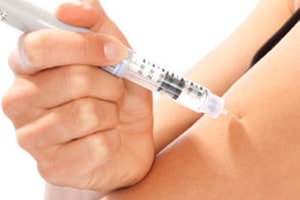
The Food and Drug Administration (FDA) is warning that some of the newer Type 2 diabetes medicines—canagliflozin (Invokana), dapagliflozin (Farxiga), and empagliflozin (Jardiance)—may cause ketoacidosis, a serious condition where the body produces high levels of blood acids called ketones. Patients with ketoacidosis may require hospitalization. The FDA is continuing to investigate the issue and will […]

FDA Warns Newer Type 2 Diabetes Drugs May Cause Ketoacidosis
The Food and Drug Administration (FDA) is warning that some of the newer Type 2 diabetes medicines—canagliflozin (Invokana), dapagliflozin (Farxiga), and empagliflozin (Jardiance)—may cause ketoacidosis, a serious condition where the body produces high levels of blood acids called ketones. Patients with ketoacidosis may require hospitalization.
The FDA is continuing to investigate the issue and will determine whether changes are needed in the prescribing information for this class of drugs, called sodium-glucose cotransporter-2 (SGLT2) inhibitors.
The FDA advises patients taking SGLT2 inhibitors to pay close attention for any signs of ketoacidosis and seek immediate medical attention if they experience symptoms such as difficulty breathing, nausea, vomiting, abdominal pain, confusion, and unusual fatigue or sleepiness. But the patient should not stop or change diabetes medicine without first talking to the doctor. Untreated diabetes can lead to serious problems, including blindness, amputations, nerve and kidney damage, and heart disease. A health care professional should evaluate a patient experiencing symptoms for the presence of acidosis, including ketoacidosis, and discontinue SGLT2 inhibitors if acidosis is confirmed. The doctor should take measures to correct the acidosis and monitor the patient’s sugar levels.
SGLT2 inhibitors are a new class of prescription medicines that are FDA-approved for use with diet and exercise to lower blood sugar in adults with Type 2 diabetes. These drugs lower blood sugar by causing the kidneys to remove sugar from the body through the urine. SGLT2 inhibitors are available either as single-ingredient products and or in combination with other diabetes medicines such as metformin. The safety and efficacy of SGLT2 inhibitors have not been established in patients with Type 1 diabetes, and the FDA has not approved them for use in these patients.
The FDA says ketoacidosis triggering factors were identified in some cases; these include acute illness or infection, urosepsis, trauma, reduced caloric or fluid intake, and reduced insulin dose. In about half the cases, the FDA said, a triggering factor could not be identified.
From March 2013 to June 6, 2014, the FDA Adverse Event Reporting System (FAERS) database identified 20 cases of acidosis reported as diabetic ketoacidosis (DKA), ketoacidosis, or ketosis in patients treated with SGLT2 inhibitors All patients required emergency room visits or hospitalization to treat the ketoacidosis. Since June 2014, the FDA has continued to receive additional FAERS reports for ketoacidosis in patients treated with SGLT2 inhibitors.


